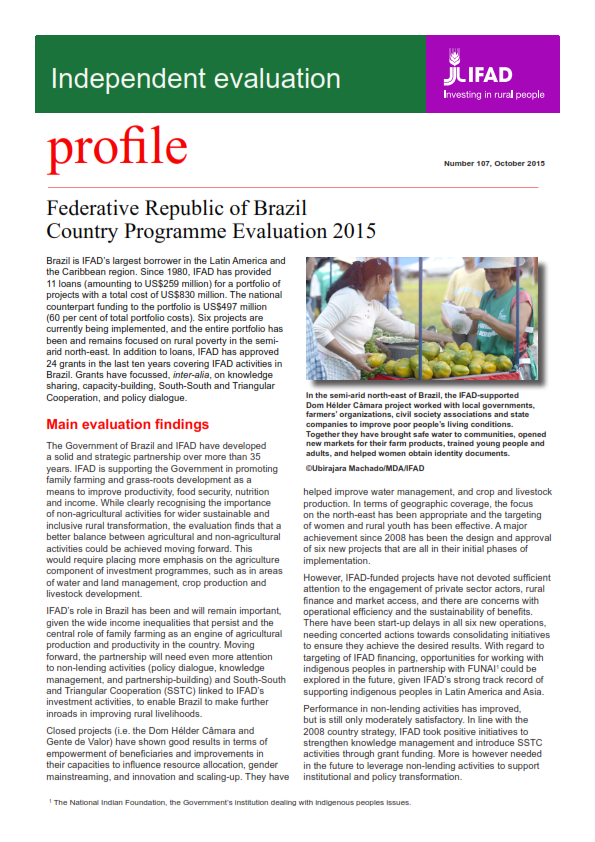Federative Republic of Brazil: Country Programme Evaluation - Profile (Issue #107 - 2015) - IOE

Federative Republic of Brazil: Country Programme Evaluation - Profile (Issue #107 - 2015)
Issue #107, October 2015
Brazil is IFAD's largest borrower in the Latin America and the Caribbean region. Since 1980, IFAD has provided 11 loans (amounting to US$259 million) for a portfolio of projects with a total cost of US$830 million. The national counterpart funding to the portfolio is US$497 million (60 per cent of total portfolio costs). Six projects are currently being implemented, and the entire portfolio has been and remains focused on rural poverty in the semi- arid north-east. In addition to loans, IFAD has approved 24 grants in the last ten years covering IFAD activities in Brazil. Grants have focussed, inter-alia, on knowledge sharing, capacity-building, South-South and Triangular Cooperation, and policy dialogue.
Main evaluation findings
The Government of Brazil and IFAD have developed a solid and strategic partnership over more than 35 years. IFAD is supporting the Government in promoting family farming and grass-roots development as a means to improve productivity, food security, nutrition and income. While clearly recognising the importance of non-agricultural activities for wider sustainable and inclusive rural transformation, the evaluation finds that a better balance between agricultural and non-agricultural activities could be achieved moving forward. This would require placing more emphasis on the agriculture component of investment programmes, such as in areas of water and land management, crop production and livestock development.
IFAD's role in Brazil has been and will remain important, given the wide income inequalities that persist and the central role of family farming as an engine of agricultural production and productivity in the country. Moving forward, the partnership will need even more attention to non-lending activities (policy dialogue, knowledge management, and partnership-building) and South-South and Triangular Cooperation (SSTC) linked to IFAD's investment activities, to enable Brazil to make further inroads in improving rural livelihoods.
Closed projects (i.e. the Dom Hélder Câmara and Gente de Valor) have shown good results in terms of empowerment of beneficiaries and improvements in their capacities to influence resource allocation, gender mainstreaming, and innovation and scaling-up. They have helped improve water management, and crop and livestock production. In terms of geographic coverage, the focus on the north-east has been appropriate and the targeting of women and rural youth has been effective. A major achievement since 2008 has been the design and approval of six new projects that are all in their initial phases of implementation.
However, IFAD-funded projects have not devoted sufficient attention to the engagement of private sector actors, rural finance and market access, and there are concerns with operational efficiency and the sustainability of benefits. There have been start-up delays in all six new operations, needing concerted actions towards consolidating initiatives to ensure they achieve the desired results. With regard to targeting of IFAD financing, opportunities for working with indigenous peoples in partnership with FUNAI1 could be explored in the future, given IFAD's strong track record of supporting indigenous peoples in Latin America and Asia.
Performance in non-lending activities has improved, but is still only moderately satisfactory. In line with the 2008 country strategy, IFAD took positive initiatives to strengthen knowledge management and introduce SSTC activities through grant funding. More is however needed in the future to leverage non-lending activities to support institutional and policy transformation.
Policy dialogue at the sub-national and regional levels has improved. For example, through REAF2, the Ministry of Agrarian Development and IFAD, have managed to successfully bring to the table the priorities of Brazilian family famers and included their representatives in the dialogue alongside government officials and other policy and decision makers.
Partnership with the Ministry of Planning, Budget and Management is very good. The same is true for the partnership with the Ministry of Agrarian Development, whose central mandate is to develop family farming for better food security in Brazil. However, partnership and dialogue with a wider range of federal agencies involved in agriculture and rural development are limited. Partnerships have been good with state governments, though involvement of municipalities deserves added attention. Partnerships with multilateral and bilateral agencies are limited. The same applies for partnership with FAO and WFP, which is a priority for the Government and IFAD, but so far has not been adequately developed.
The establishment of the IFAD Country Office in Salvador in mid-2011 has enabled IFAD to conduct more timely supervision and provide implementation support to projects, and to strengthen dialogue in the north-east. In fact, direct supervision and implementation support in all projects has been an important adjustment to IFAD's operating model since the 2007 Brazil CPE. However, the location of the country programme manager for Brazil at IFAD headquarters in Rome is a factor that will need to be carefully considered, as it is constraining further improvements in the overall effectiveness of IFAD- Brazil partnership.
Weaknesses in monitoring and evaluation (M&E) and results measurement have been a common problem across the portfolio, although there are some signs of improvement. M&E systems are inadequate to capture outcome- and impact-level data. The application of IFAD's.
Key recommendations
Focus country strategy and operations more on agricultural activities. The country strategy and projects should devote more resources to smallholder agricultural activities, while providing continued attention to supporting essential non- agricultural services and inputs.
Strengthen engagement in non-lending activities. This will require more attention to: capturing project experiences and disseminating lessons learned and good practices; a closer dialogue with a wider range of federal agencies; and concrete partnerships with multilateral and bilateral development organizations including for SSTC.
Further adjust IFAD's operating model for greater development effectiveness. A better balance should be aimed at between operational supervision and implementation support, and national policy dialogue with federal agencies for scaling up impact and knowledge sharing. This includes the need to out-post the Brazil Country Programme Manager from the Fund's headquarters in Rome to Brazil.
1/The National Indian Foundation, the Government's institution dealing with indigenous peoples issues.
